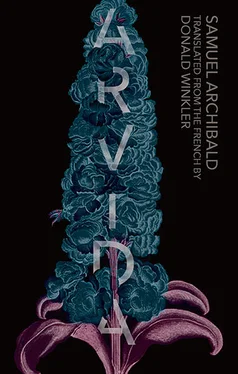Here, I mean there, we were kings of nothing, princes of our sorry backsides.
In many respects, the exile had begun long before.
In 1993 my grandmother left the Saguenay and returned to Beauport, from which her sisters had never strayed very far, and where her son Georges and his wife Maud were then installed.
The last time I saw her was in 2002. She was in a hospital room in Quebec City, and was not wearing her glasses. As in an old engraving, she was staring with bulging eyes at the emptiness over her bed, as though an incubus were hovering there with its black wings spread wide. The hospital was one of those beautiful old Quebec buildings that take you back in time despite yourself, with ghostly good sisters coming at you around a bend in the corridor, and visitors wondering whatever happened to their hats and their gaiters.
It was winter, and I have no memory of the view from the window. Perhaps the curtains were drawn, it seems to me that it was very dark. We’d spent the afternoon there with my aunts Lise and Hélène. Both of them doctors, they were engaged in an ongoing struggle with their male colleagues to have the doses increased. Those men no longer went to Mass or crossed themselves when a priest passed by, but curiously, they still believed that there was some grace to be found in suffering.
At one point, a lovely nurse about forty years old, energetic and sexy, came into the room to adjust my grandmother in her bed and to see if everything was going well. She tried to make conversation with her by asking her who were the people with her. My grandmother pointed to my aunts, saying with pride that they were her two daughters, both doctors.
The nurse added:
“And those two handsome boys, who are they, Madame Archibald?”
My grandmother stared at us for a long time, as if she’d never seen us in her life, and she said, in a panic:
“I don’t know, my grand nephews I think. Or little cousins.”
My Aunt Lise laughed nervously.
“No, mama. They’re David and Sam, Dougie’s sons.”
My grandmother put her hand to her brow and said she was tired. She then shifted her gaze to the unseen exterminator perched over her bed. She breathed a long sigh.
My Aunt Hélène, a lung specialist who nevertheless shared our nicotine addiction, took us aside and said:
“Let’s go smoke a cigarette, boys, we’ll let your grandmother sleep.”
Outside, Hélène and Lise explained that our grandmother would have forgotten them as well, had they not been at her bedside for two weeks. She only remembered the names of her children because they had been dictated to her. She remembered the Beauport of her youth, of her own beauty, and of her fiancé Georges-Émile. She talked about her sisters Marielle, Nicole, Georgette, and Monique, and of her sisters-in-law, Nyna, Mabel, Maude, and Gemma, who had become her good friends. She remembered her childhood and adolescence and her whole life up to her marriage, but she’d forgotten Arvida.
At that point, I should have understood that in fact there was nothing more Arvidian than to forget Arvida itself. I should have understood that I was myself free to leave it forever, because in any case I was incapable of forgetting anything at all. But I was too young. And my brother and I were devastated.
Lise told us that our grandmother remembered the time when her life was her own, before in Arvida it became that of others. In Arvida her life had been that of her children, then of the priests who came to eat with the family on Sunday, then of the little hockey players, atom, peewee, and bantam, then of her sick son and her sick husband, then of David and me when our parents had divorced.
We shouldn’t be upset that she’d forgotten us, she said. She no longer remembered anything of her life with us in Arvida because that life, she’d already given us.
I looked at my brother. The only intelligent thing I found to say, which was not really intelligent when I think of it, came right out of the language of sports, those rough recreations in which the Arvidians of the entire world batter their bodies, while in their heads make short work of everything they can’t forget.
I said, in English:
“Nice try, but no cigar.”
She died the next day, my grandmother, mother of my father.
Her body lay in repose during all of the month of January. After, when the ground had thawed in the Saguenay, they brought her back to Arvida to bury her beside my grandfather.
1 It has to be said, however, that there’s something a bit overblown in this picture. In the city’s original plan, before the parishes were founded and the lots fully occupied, the “English” town and the “workers’” town were built a good distance from each other.
2 Another Arvidian myth may be similarly discredited: for a long time it was bruited about that the original design for the town had been conceived with the idea of tracing on its very ground the letters A-R-V–I-D-A, visible from the sky. Such a project, which would imply inscribing a bit of the world’s map onto the world itself, would have been unthinkable in the watchful minds of urbanists between the wars.
3 My favourite anecdote, when it comes to my father’s sporting fame, is also the earliest. One day, when he was six, my grandfather took him to the neighbourhood skating rink. My father was assigned to the blue team, and he scored eight goals. The other parents were angry and laughing at the same time, and after half an hour it was decided that he would switch teams. After a pause, my father pulled on a red sweater, glided onto the ice, and went on scoring goals as if it was the simplest thing in the world. There were eleven other boys on the ice, four who sent him awkward passes, five who tried to stop him from scoring, one bored goalie, and another who’d developed a gut feeling for what a partridge feels on the first day of hunting season. There were eleven other boys on the ice, on which a beautiful winter sun was shining, and it was as if my father were there all alone, at nightfall, practising his skating and his shots on goal.
My grandfather was bursting with pride. He said to everyone, “That’s my son.” He blushed and stammered when other fathers congratulated him, he had the same expression as on the spring night he went to knock at my grandmother’s door in Beauport, my grandmother who lived with her parents, and he who knocked, bearing his insignificant bouquet of daisies. He had the same expression as when she said, “Yes, that would be nice, let’s take a walk.” Exactly the same, except that he’d aged.
After a while, the other boys began to have had enough, and to the chagrin of their fathers, they started to behave like children. A little blonde boy began to sob like a sissy because my father had made him trip as he stole the puck from him for the fourth time. Another threw a tantrum because he could never get to touch that damn puck. Yet he was on the same team as my father, and from the stands you couldn’t see what he was complaining about. He tried unsuccessfully to shatter his stick by hitting it against the boards, then threw it as far as he could, left the rink, teetering on his skates, and refused to go back on the ice.
When the reds had scored eight goals, it was decided that enough was enough. All the fathers had enjoyed themselves, while all the children left in bad humour. My father included.
He sulked on the way home with his father and big brother, he sulked some more at home sitting at the dining room table, while my grandfather and uncle recounted his exploits to the rest of the family, describing his sixteen goals one by one, with the verve and precision of the voices on the radio. He sat tight-lipped, with his arms crossed. My grandmother set a steaming plate in front of him, full to the brim, which smelled good, but that he glared at as though it were full of gravel. When my grandmother, who’d pretended not to notice his behaviour for a good quarter of an hour, returned to the table with two more plates, she asked him:
Читать дальше












